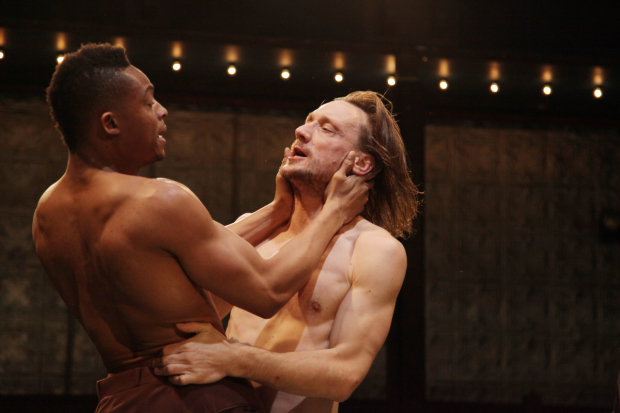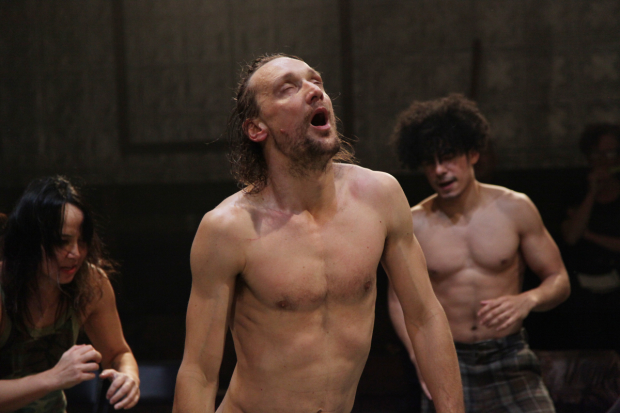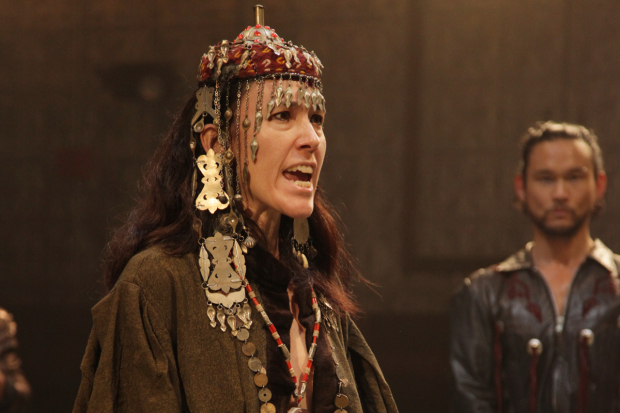Pylade
Social change and terrible violence in ancient Greece mirrors our modern world in this U.S. debut.

(© Theo Cote)
Although written in the 1960s and set thousands of years before that, Pylade feels eerily close to 2015. Written by late Italian playwright and intellectual Pier Paolo Pasolini, it is now making its U.S. debut with Great Jones Repertory Company at La MaMa. Under the direction of Ivica Buljan (of the Croatian National Theatre), the ensemble presents Pasolini's prescient vision in this inconsistent but still timely production.
In addition to being a playwright, Pasolini was a poet, essayist, novelist, and filmmaker, bringing his maverick perspective to every endeavor. A staunch Marxist, Pasolini nevertheless regularly clashed with the Italian left. He also steadfastly rejected the notion of "art for art's sake," something readily on display in this intensely political play.
Pylade picks up where Aeschylus left off in the Oresteia: Recently acquitted by the goddess Athena (Maura Nguyen Donohue) of the murder of his mother and her lover, Orestes (Tundé Sho) returns to Argos, not to assume the throne of his dead father, King Agamemnon, but to declare a democracy guided by Athenian values. His sister, Electra (Mia Yoo), is outraged by this abandonment of tradition, believing her family's royal right to be the bedrock of civilization. While the well-heeled people of the city revel in their new liberties, reports emerge of furies ravaging the countryside. Orestes dismisses these as the hallucinations of the mad and the poor. "Are not the mad and the poor your citizens?" asks his best friend, Pylade (Marko Mandić). He is skeptical that Orestes' brave new world can offer justice for the masses.
In one key moment, Buljan encapsulates the classist disconnect that hovers over this play: As an old man from the mountains (Perry Yung) describes the plague leveled on his animals, a raunchy and graphic ménage à trois takes center stage. It becomes very difficult to focus on the old man's words. How are we to pay attention to the woes of the poor amid such delicious distraction? Does liberty really only offer libertinism, instead of real social and economic justice? Disillusioned, Pylade betrays Orestes, calling for a revolution against his liberal democracy.

(© Theo Cote)
Pylade leads his peasant army in what appears to be an ancient Greek version of Pilates: strenuous core exercises preparing them to wipe away the urban rich. This sweaty homosocial activity, with its unbridled rage and uncompromising determination, has more than a whiff of fascism about it. Increasingly unhinged, Pylade's aggressive and hypersexualized id drives this play toward its somewhat anticlimactic conclusion. He copulates with a watermelon while musing on his desire to "fertilize anything," and we realize that Pylade can only lead a violent, irrational movement, one that the goddess of reason must destroy.
Naked, muddy, spitty, horny, angry: The passionate violence of Buljan's staging stands in sharp contrast to the stilted, academic text (dusty translation by Adam Paolozza and Coleen MacPherson). It often feels like porn underscored by the audiobook version of a political science dissertation. Other times, Buljan's frenetic choreography obscures the finer points of the script, rendering them incomprehensible. Like the citizens of Argos, we denizens of downtown theater have trouble processing these pressing sociopolitical concerns within the context of a three-ring circus.
Luckily, our leading man is able to find a happy synthesis of passion and politics: With his manic delivery and thick Slovenian accent, Mandić's Pylade is like a sexy Slavoj Žižek. Even when we're not exactly sure what he's talking about, we recognize his frightening charisma.
Mandić sets the pace for this energetic and fearless ensemble. Eugene the Poogene convincingly plays one of Pylade's dead-eyed soldiers, flexing his muscles in an indiscriminate show of strength. As "The Boy," John Gutierrez gives an impressively acrobatic performance: The danger of splinters is palpable as he scales a wooden support beam wearing absolutely nothing.

(© Theo Cote)
When the actors are clothed, Ana Savić Gecan's costumes give a clear sense of their social station and role in the play (Electra's Asiatic princess drag is especially memorable). Michael Sirotta underscores everything with his heart-pounding original music, thrillingly executed by an ensemble of three. Staged in traverse, we feel the full brunt of this tale of cyclical cataclysmic confrontation.
"I do not prophesy this right wing revolution and the war for those who will live through it, but for those who will forget it," Athena tells Orestes after conjuring images of terrifying barbarism. It's a prediction we would do well to heed. Pylade is the tragedy of the hubris of the liberal elite and the nihilism of the disenfranchised — a tragedy our world is presently living through again as people across the globe increasingly turn to extremist ideology.









